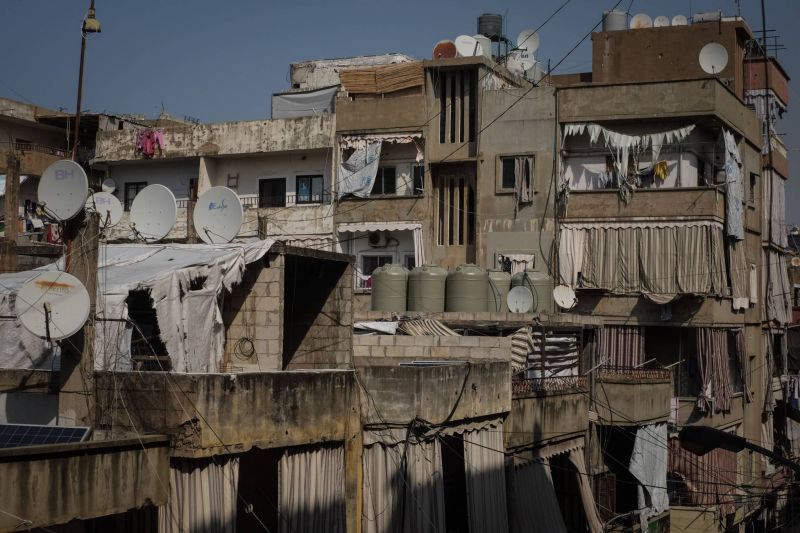
Water tanks on the roof of an apartment building in Beirut. Electricity cuts at the Dbayeh pumping station have meant weeks of water shortages for residents in Beirut and Metn. (Credit: João Sousa/L'Orient Today/File photo)
Want to get the Morning Brief by email? Click here to sign up.
Higher Judicial Council (HJC) chair Souhail Abboud said the council will remain operational and urged magistrates to continue working after hundreds of judges said earlier this month that they would strike over low wages. "In light of the HJC’s position, the judges who had planned to strike should convene to discuss their decision [whether or not to go on strike]," a judge told L'Orient Today. A source close to the Judges' Mutual Fund told L'Orient Today that Chief Financial Prosecutor Ali Ibrahim is awaiting the receipt of approximately $11.2 million approved by the government for the judges' fund. Beirut Bar Association President Nader Gaspard, however, disapproved of the strike, noting that lawyers will be unable to practice while judges will continue to receive salaries. Judges' salaries, as other public sector workers', fell sharply as a result of the lira's depreciation. Judges returned to work in January after a monthslong strike demanding improved compensation, and they have been receiving cash grants between $500 and $1,200 depending on their rank.
Internal Security Forces (ISF) arrested a man after he and his wife attempted to forcibly recover their funds from a Corniche al-Mazraa, Beirut branch of the Arab Finance House, a spokesperson for The Depositors’ Cry group told L’Orient Today. The same source claimed the ISF “aggressively” ousted the couple from the bank, preventing their attempt to recover a $40,000 deposit frozen by informal restrictions instated by commercial banks in 2019. Holdups by depositors — sometimes armed — attempting to recover their own blocked funds proliferated since last September.
Lebanese Army chief Joseph Aoun expressed apparent disinterest in the presidency, claiming that “no one discussed the presidency with [him],” amid repeated rumors of international support for his candidacy. Aoun’s statement comes amid discord between political parties over Parliament Speaker Nabih Berri’s call to a dialogue aiming to ease the presidential impasse. Maronite Patriarch Bechara al-Rai yesterday denied supporting the dialogue initiative while emphasizing the importance of consensus and claiming dialogue should occur during voting sessions. In comments to Le Figaro published Monday, caretaker Prime Minister Najib Mikati said the election of a president antagonizing Hezbollah would be “illogical.”
The Beirut and Mount Lebanon Water Establishment (EBML) said electricity cuts at its Dbayeh pumping station and malfunctions at its Mushrif wells were behind water shortages in different areas of the capital. Achrafieh residents confirmed to L’Orient Today they had experienced over a month of water shortages, forcing them to rely on expensive private water suppliers. EBML's statement said it was working "as quickly as possible" to restore water to Achrafieh, Burj Abi Haidar, Burj al-Barajneh, Hay al-Sellom and the Metn coast. Last month, EBML warned it would resort to severe rationing due to fuel shortages interrupting its pumping operations.
The Telecoms Ministry announced an $8 million donation from China to equip more than 380 of state telecom provider Ogero's sites with solar power. The project is expected to become operational in "the summer of 2024," the ministry said. Earlier this year, fuel shortages threatened Ogero's ability to keep its network operational. The cabinet has since allocated to Ogero LL1.5 billion in maintenance and development fees and a portion of fuel from an Iraqi barter deal supplying state electricity provider Electricité du Liban.
Only $76 million remains of Lebanon's September 2021 allotment of $1.135 billion in International Monetary Fund Special Drawing Rights (SDRs), according to Banque du Liban (BDL) figures published Monday. Lebanon's SDRs fell by $49 million since the end of August, after remaining stable during the month's second half. The government reportedly expended the SDRs on electricity, wheat and medicine subsidies. BDL also announced a $22 million decline in foreign assets, which it claimed were being used to finance Circular No. 158, allowing depositors to withdraw limited amounts from their informally frozen commercial bank accounts.
In case you missed it, here’s our must-read story from yesterday: “In Lebanon's economic crisis, a lack of means equals a lack of healthcare”
Compiled by Abbas Mahfouz
